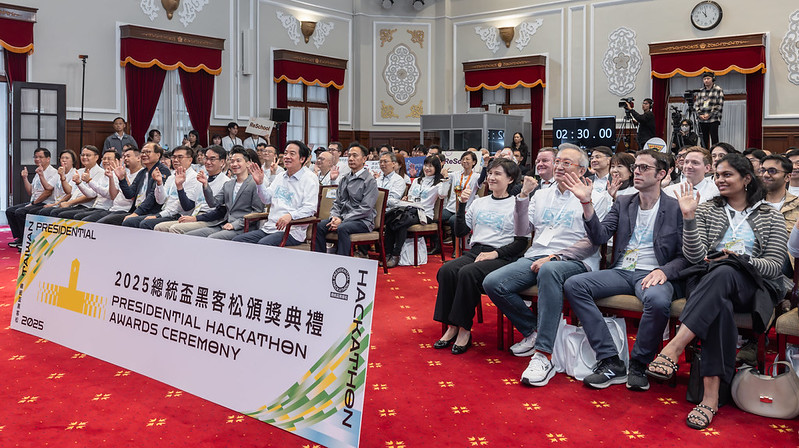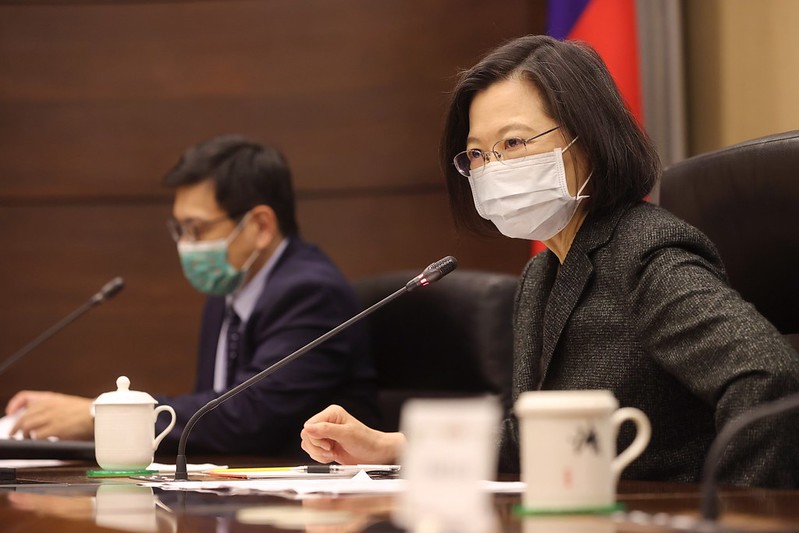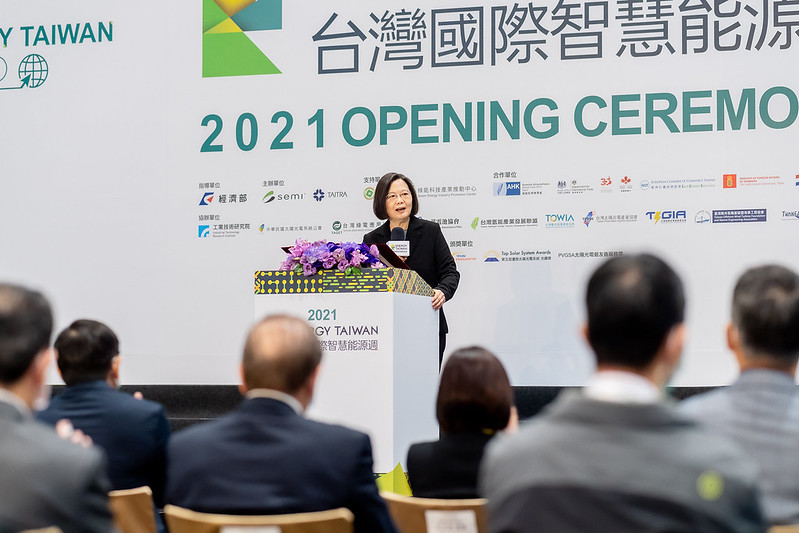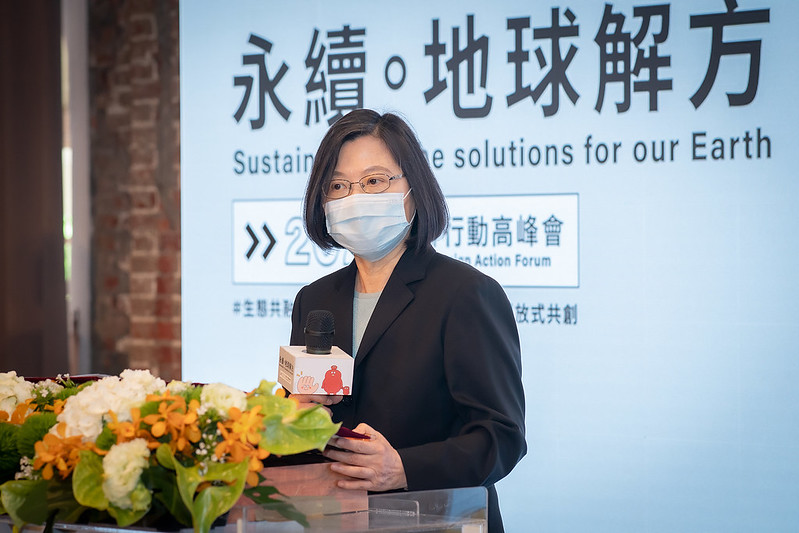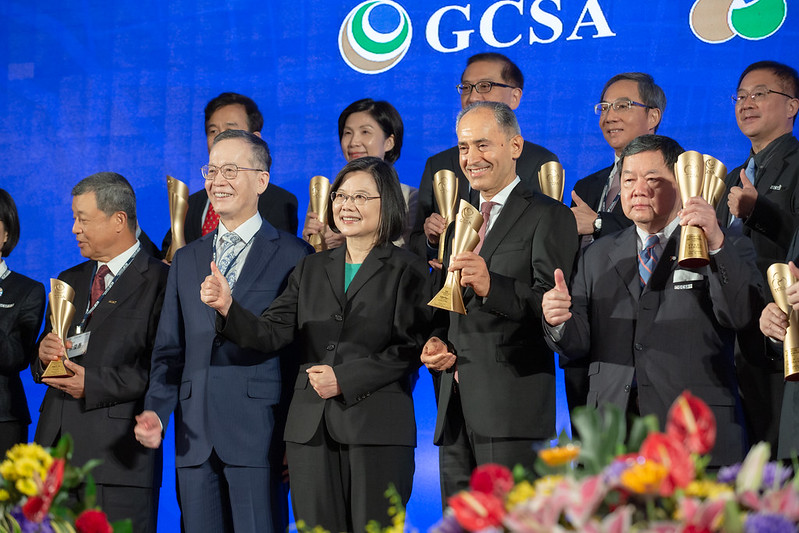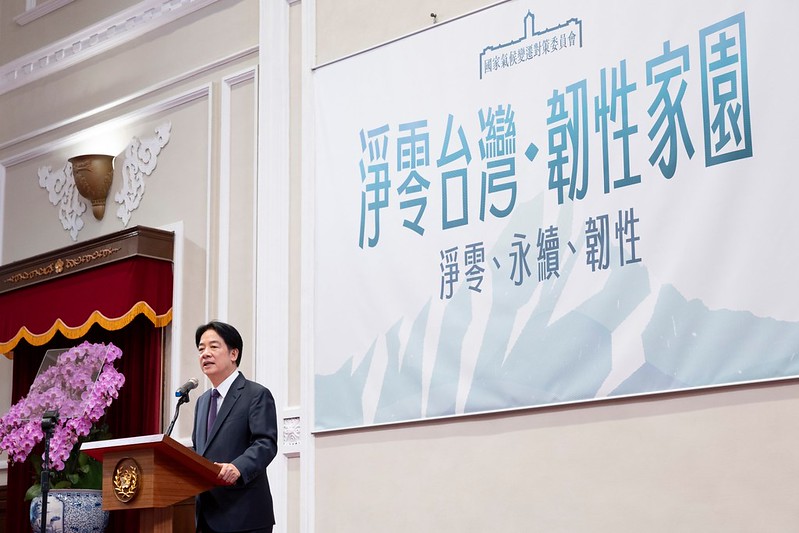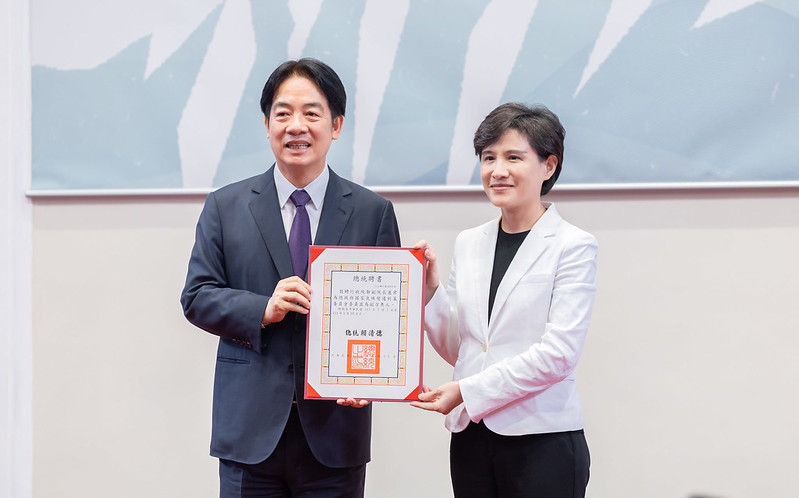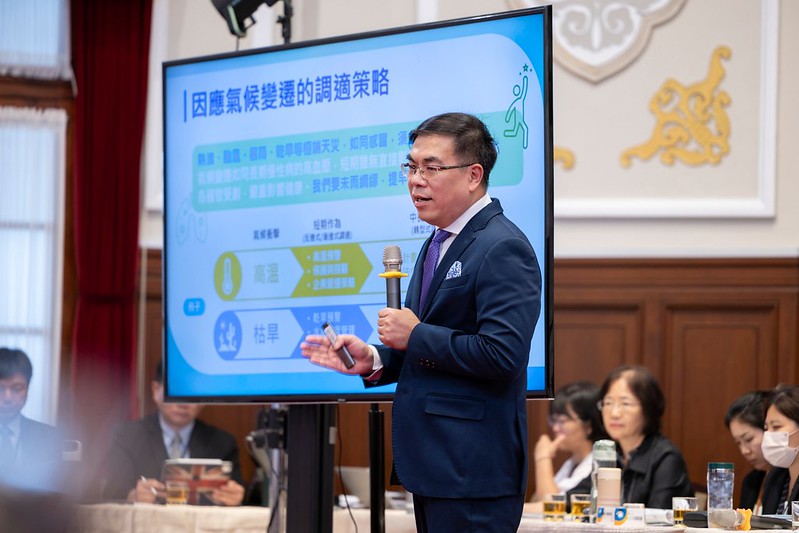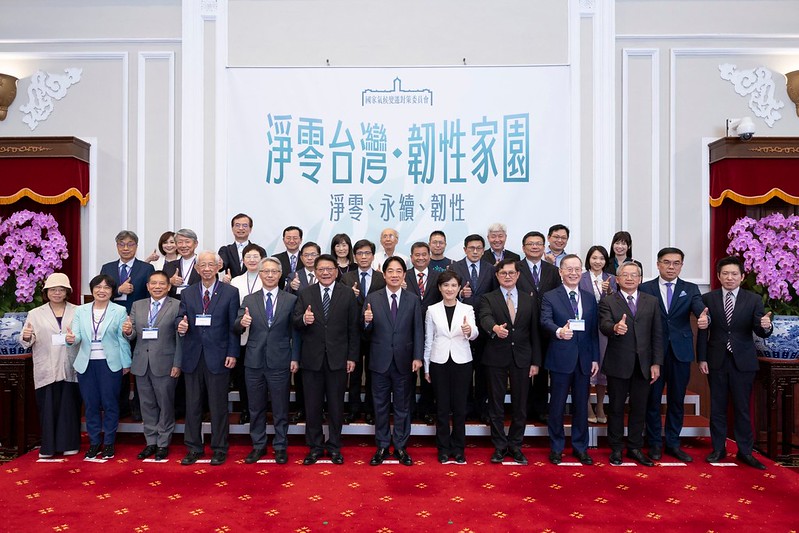News & activities
 News releases
News releases
On the afternoon of August 8, President Lai Ching-te presided over the first meeting of the National Climate Change Committee. As the committee’s convener, the president presented committee members with their letters of appointment, and explained that, in line with the principle of equity, the committee has drawn its members from a diverse range of disciplines, generations, and perspectives. This demonstrates the government’s determination, he said, to forge a social consensus through diversified dialogue, and to unite the public in addressing the major challenges to future global and domestic development.
President Lai emphasized that energy issues are complex and not simply a black-and-white matter of being for or against nuclear energy. Every strategic national policy decision, he said, is bound to present multiple-choice questions complicated by the fact that more than one right answer may be possible. The president stated that he aims to address issues honestly, propose solutions pragmatically, and resolve problems practically through the committee’s discussions, with the goal of formulating strategies for the nation’s sustainable development so that Taiwan society can forge a consensus and the nation can indeed develop sustainably.
A translation of President Lai’s opening statement follows:
Today is Father’s Day, so first I want to wish fathers around the world a happy Father’s Day. I also want to thank everyone for taking the time to participate in today’s meeting, especially on this holiday.
There are many fathers here today, and Committee Member Huang Pin-han (黃品涵), who recently gave birth and is still in postpartum care, insisted on attending. Let’s give her a warm round of applause.
I also want to thank all our friends watching the live broadcast, who are joining us in showing their concern for the nation’s future and development.
To respond to the impacts of global climate change, global infectious diseases, and the challenges posed by shifting global geopolitics, I announced the establishment of three committees at the Presidential Office one month after my inauguration: the National Climate Change Committee, Healthy Taiwan Promotion Committee, and Whole-of-Society Defense Resilience Committee.
I hope these three committees will fulfill three major functions of serving as platforms for social engagement, bridges for communication within society, and engines for policy effectiveness.
This demonstrates the government’s determination to forge a social consensus through diversified dialogue and unite the public to address the major challenges of future global and domestic development.
In line with the principle of equity, the members of these three committees are drawn from a diverse range of disciplines, generations, and perspectives.
For example, the National Climate Change Committee includes eight cabinet ministers and commission heads, with Minister of Environment Peng Chi-ming (彭啓明) serving as the executive secretary.
National climate governance, however, involves broad and profound issues, requiring the public and private sectors to join forces and work together. As a result, 65 percent of this committee’s members are not government officials. In addition, 28.5 percent of members are women.
There are six representatives from the industrial sector, and we want to express our gratitude to enterprise representatives Paul Peng (彭双浪), Lai Po-szu (賴博司), Terry Tsao (曹世綸), Sophia Cheng (程淑芬), Lydia Hsiao-mei Lin (林筱玫), and Taipower Company Chairman Tseng Wen-sheng (曾文生) for their participation. Their involvement will extend Taiwan’s strategic thinking about climate and energy across traditional sectors, fields, and high-tech industries, account for the needs of emerging industries of the new era such as AI and international green finance, and ensure that we look ahead to the future and align with international trends.
The number of our representatives from the civil society sector is equal to that of the industrial sector, with six pioneers of environmental movements representing multiple generations invited to participate: Shih Shin-min (施信民), Lee Ken-cheng (李根政), Chao Chia-wei (趙家緯), Ho Tsung-hsun (何宗勳), Huang Pin-han (黃品涵), and Chen Hui-ping (陳惠萍).
They all represent efforts at the frontlines of environmental movements. We are deeply grateful for your participation and look forward to jointly expanding dialogue with civil society, working together to achieve greater depth and breadth in systemic change.
Of course, we also invited scholars and experts from various disciplines to join. We are very grateful to Lin Tze-luen (林子倫), Chou Kuei-tien (周桂田), Tseng Chung-jen (曾重仁), and Su Huey-jen (蘇慧貞) for their participation. Their respective backgrounds in the humanities, science and engineering, environmental health, medicine, and public health will help us gain a more comprehensive understanding of climate change issues.
The committee is meeting for the first time today, and we are beginning by discussing issues that are the focus of particular concern to our society. First, we will hear a report from the Ministry of Environment assessing the impacts of climate change on both the globe and Taiwan. Following that, Chairman Tseng will deliver a report on the transition and challenges related to power supply and demand in Taiwan.
Due to the impacts of extreme weather, more and more experts are warning that each summer from now on is likely to be “one of the coolest summers of the rest of our lives.”
Increasingly, what were once considered “once-in-a-century” droughts and storms are occurring in rapid succession. Over the past eight years under the Democratic Progressive Party (DPP) administration, the government had to establish two emergency response centers at least 19 times, either in close succession or simultaneously – one to address drought and the other to manage flooding.
Late last month, Typhoon Gaemi brought disastrous rainfall in Chiayi and three other counties and municipalities south of it. Single-day precipitation levels in both the lowlands and mountainous areas were comparable to those brought by Typhoon Morakot in 2009, and in some areas even exceeded Morakot. Statistics from the Ministry of Agriculture indicate that nationwide losses from damage to agricultural property and private facilities are already in the billions of New Taiwan Dollars.
Extreme precipitation caused by global extreme weather, as well as heat waves and other such disasters pose formidable challenges to all countries.
A sudden natural disaster is like an acute cold, while climate change is more like a chronic disease. But no matter which type of problem we’re facing, we all have a responsibility to continue strengthening Taiwan’s ability to adapt to the risks associated with extreme weather, and to continually make our nation more sustainable and more resilient.
Of course, I realize that the stability of Taiwan’s power supply is a matter of concern not only to us in Taiwan. It’s also important to international supply chains. There has recently been widespread discussion regarding the issue of nuclear power.
Twenty-plus years ago, back when I was a member of the Legislative Yuan, working across party lines I co-sponsored a draft version of the Basic Environment Act. The Act has come to be known as Taiwan’s “environmental constitution,” and it is the first law in Taiwan to incorporate the concept of a “nuclear-free homeland.” Article 23 of the Act reads that the government shall formulate a plan to progressively achieve the goal of a nuclear-free homeland.
Although the DPP was the ruling party at that time within the executive branch, we did not have a legislative majority. The fact that we were able to get the Basic Environment Act passed by reaching a consensus between the ruling and opposition parties is proof that the concept of a nuclear-free homeland is not just an ideological stance of the DPP. Sustainable development is a goal that we all agree upon, regardless of party affiliation, and one that we’re all working together to achieve.
I hope that through this committee, everyone can realize that energy issues are complex and not simply a black-and-white matter of being for or against nuclear energy. Every strategic national policy decision is bound to present multiple-choice questions complicated by the fact that more than one right answer may be possible. That’s the only way we can address issues honestly, propose solutions pragmatically, and resolve problems practically.
Therefore, I want to say to every one of you, that to have differing positions is typical in a democracy. Having diverse opinions is, in fact, the best thing about democracy.
I hope that the committee’s discussions will impress upon the 23 million people of Taiwan that we can all have our different viewpoints, but we only have one Taiwan. We can all have our different stances, but we still have one goal that we all agree upon, and that is our nation’s sustainable development.
Our shared mission is to think flexibly and brainstorm among a broad range of people, with the goal of formulating strategies for the nation’s sustainable development so that Taiwan society can forge a consensus. Once again, I want to thank everyone for your willingness to take on such an important task. I’ll soon ask each of you to actively share your thoughts, professional expertise, and experience with us, to help us resolve problems and to help Taiwan keep moving forward. Thank you.
Following his statement, President Lai presented letters of appointment to the committee members, heard a report assessing the impacts of climate change on both the globe and Taiwan presented by Minister Peng, and a report on the transition and challenges related to power supply and demand in Taiwan presented by Chairman Tseng. Afterward, President Lai exchanged views with the committee members regarding the content of the two reports and the Rules of Procedure for Meetings of the Office of the President National Climate Change Committee.
